
Related
Topics
The longest and sharpest argument came over foreign policy and Senator Barack Obama’s comments last week that he would be willing to attack areas in Pakistan with or without approval of the Pakistani government. Obama said, “If we have actionable intelligence about high-value terrorist targets and President Musharraf will not act, we will.” Obama came under attack from his Democratic rivals for his comments. [includes rush transcript]
Transcript
AMY GOODMAN: We turn now to the Democratic presidential candidates facing off last night in a, well, fiery, for them, debate in Chicago. An estimated 17,000 union workers and their families filled end-zone seats at Chicago’s Soldier Field for the outdoor debate sponsored by the AFL-CIO. Seven of the eight presidential hopefuls took part, with former Senator Mike Gravel not in attendance. The 90-minute forum was broadcast on MSNBC, moderated by Keith Olbermann.
The longest and sharpest argument came over foreign policy: Senator Barack Obama’s comments last week that he would be willing to attack areas in Pakistan with or without approval of the Pakistani government. Obama said, “If we have actionable intelligence about high-value terrorist targets and President Musharraf will not act, we will.” Well, Obama came under attack from his Democratic rivals for his comments. At the debate last night, moderator Keith Olbermann brought up the issue.
KEITH OLBERMANN: Senator Dodd, last week you had said that Senator Obama, quoting you, assertions, “his assertions about foreign and military affairs have been, frankly, confusing and confused.” You added, “He should not be making unwise, categorical statements about military options.” What, in your opinion, has been confusing?
SEN. CHRISTOPHER DODD: Well, let me say, on these matters here, I’ve spent 26 years on the Foreign Relations Committee dealing with these matters here in almost every major foreign policy debate. Words mean things. We’ve got to be very careful about language that’s used, in terms of the danger and harm it can do to our nation.
My view was, when you raise — issues are being raised about Pakistan, understand that while General Musharraf is no Thomas Jefferson, he may be the only thing that stands between us and having an Islamic fundamentalist state in that country. And so, while I’d like to see him changed, the reality is if we lose him, then what we face as an alternative could be a lot worse for our country. I think it’s highly responsible — or irresponsible for people who are running for presidency and seek that office to suggest we may be willing unilaterally to invade a nation here that we’re trying to get to be more cooperative with us in Afghanistan and elsewhere.
So my view is — and I say this respectfully to my friend from Illinois here — I think it was wrong to say what he did in that matter. I think it’s important for us to be very careful about the language we use, make it clear that if this United States is going to build relationships around the world, we’re going to have to do so with allies, in some cases allies that we may not particularly like.
KEITH OLBERMANN: Senator Dodd, thank you.
SEN. BARACK OBAMA: Chris?
KEITH OLBERMANN: Senator Obama, yes, you’ve taken some hits here from us. So yours is the last word on this subject.
SEN. BARACK OBAMA: Well, look, I find it amusing that those who helped to authorize and engineer the biggest foreign policy disaster in our generation are now criticizing me for making sure that we are on the right battlefield and not the wrong battlefield in the war against terrorism.
And, Chris, respectfully — and you and I are close friends — but the fact is, you obviously didn’t read my speech, because what I said was that we have to refocus, get out of Iraq, make certain that we are helping Pakistan deal with the problem of al-Qaeda in the hills between Afghanistan and Pakistan. But, Chris, if we have actionable intelligence on al-Qaeda operatives, including bin Laden, and President Musharraf cannot act, then we should. Now, I think that’s just common sense.
I don’t know about you, but for us to authorize — the place where the people who attacked — where the people who attacked 3,000 Americans were not present, which you authorized, and then to suggest that somehow we should not focus on the folks that did attack 3,000 Americans, I think is a problem.
KEITH OLBERMANN: Senator Obama, we’re well over time. Senator Clinton, I must ask for your — Senator Clinton? Senator Clinton, give me your response to this. We’re going to — I’m going to give you both a chance here, but Senator Clinton, please give me your response to what we’re hearing tonight.
SEN. HILLARY CLINTON: Well, I do not believe people running for president should engage in hypotheticals. And it may well be that the strategy we have to pursue on the basis of actionable intelligence — but remember we’ve had some real difficult experiences with actionable intelligence — might lead to a certain action. But I think it is a very big mistake to telegraph that and to destabilize the Musharraf regime, which is fighting for its life against the Islamic extremists who are in bed with al-Qaeda and Taliban. And remember, Pakistan has nuclear weapons. The last thing we want is to have al-Qaeda-like followers in charge of Pakistan and having access to nuclear weapons. So you can think big, but remember, you shouldn’t always say everything you think if you’re running for president, because it has consequences across the world, and we don’t need that right now.
KEITH OLBERMANN: Senator Dodd, I owe senator a response. Your name was invoked in several of these answers. Please take 30 seconds here.
SEN. CHRISTOPHER DODD: Well, I just want to say, look, and Barack, you know, I certainly said, look, I made a mistake in that vote in 2002. I don’t deny that. But when you make a mistake, as you will on something like this, I think if I had the courage — I made a mistake on the vote in 2002 — if you make a mistake today, you ought to stand up and say so. It was a mistake, in my view, to suggest somehow that going in unilaterally here into Pakistan was somehow in our interest. That, I think, is dangerous, and I don’t retreat from that at all.
SEN. BARACK OBAMA: I’m sorry, but this came back to me, and so let me just be clear about this.
KEITH OLBERMANN: Alright, Senator Obama, 30 seconds, and then I have to stop this.
SEN. BARACK OBAMA: I did not say that we would immediately go in unilaterally. What I said was that we have to work with Musharraf, because the biggest threat to American security right now are in the northwest provinces of Pakistan, and that we should continue to give him military aid contingent on him doing something about that. But the fact of the matter is, is that when we don’t talk to the American people — we’re debating the most important foreign policy issues that we face, and the American people have a right to know. It is not just Washington insiders that are part of the debate that has to take place with respect to how we’re going to shift our foreign policy.
AMY GOODMAN: Senators Barack Obama, Christopher Dodd and Hillary Clinton, all Democratic presidential hopefuls in the debate last night in Chicago. Later in the debate, a union worker with crutches posed a question to Democratic candidate John Edwards.
UNION WORKER: After 34 years with LTV Steel, I was forced to retire because of a disability. Two years later, LTV filed bankruptcy. I lost a third of my pension, and my family lost their healthcare. Every day of my life I sit at the kitchen table across from the woman who devoted 36 years of her life to my family, and I can’t afford to pay for her healthcare. What’s wrong with America, and what will you do to change it?
KEITH OLBERMANN: Senator Edwards.
JOHN EDWARDS: Bless you, first of all, for what you’ve been through. You’re a perfect example of exactly what’s wrong with America, both on pension protection and on healthcare. And we’ve unfortunately not been able to do the things that need to be done in this country.
I have a very simple view about this. My view is that we ought to treat the pensions and the retirement of the chairmen and CEOs of companies exactly the way we treat every other worker in the company. We ought to have — and we ought to have universal healthcare in this country. That’s what we have to do here. And we ought to have — and we ought to have universal healthcare in this country. We need it in the worst kind of way, so that when you’re bargaining, you’re not bargaining about healthcare cost.
But I want to say one other thing: I intend to be the president of the United States who walks onto the White House lawn and explains to America how important unions and organized labor is to the future and the economic security of this country. It is fine to come up on this stage and give a nice talk. The question is, who’s been with you in the crunch? In the last few years, 200 times I have walked picket lines, I have helped organize thousands of workers with 23 national unions, I have worked with employers. Here’s what you need to ask yourself: it’s great to give a talk —
AMY GOODMAN: Senator? Senator, we’re out of time.
JOHN EDWARDS: Let me finish this. It’s great to give a talk — it is great to give a talk, but who was with you in crunch time? Because if we were with you in crunch time, we will be with you when crunch time comes for you and all of organized labor. That’s the question you need to ask yourself. Who will stand with you when it really matters?
AMY GOODMAN: Then Ohio Congressmember Dennis Kucinich hit one out of — OK, mixed sports metaphor — Soldier Field, addressing thousands of union workers.
SEN. DENNIS KUCINICH: I’m kind of the Seabiscuit of this campaign. And when I come from behind to win this race, people are going to say, “No way we’re going to run against this guy.” And so — and another reason they’re going to say it is because my first month in office: cancel NAFTA and the WTO; trade based on workers’ rights, human rights and environmental quality principles; a not-for-profit healthcare system; saving Social Security; making sure we have universal pre-kindergarten. Let me tell you, when I push through that agenda and establish a workers’ White House, they are going to be there to say, “No competition in 2012. We’re ready for Kucinich for seven years, eight years. Let’s keep going. Make it happen.”
AMY GOODMAN: Excerpts of the debate at Soldier Field of the Democratic presidential hopefuls. And that does it for today’s broadcast. That debate was moderated by Keith Olbermann of MSNBC.

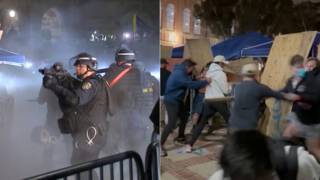
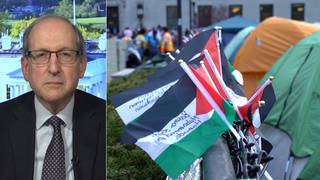
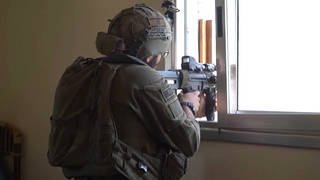
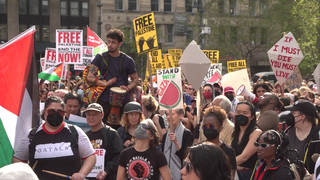






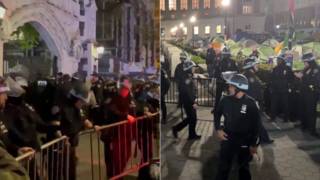
Media Options